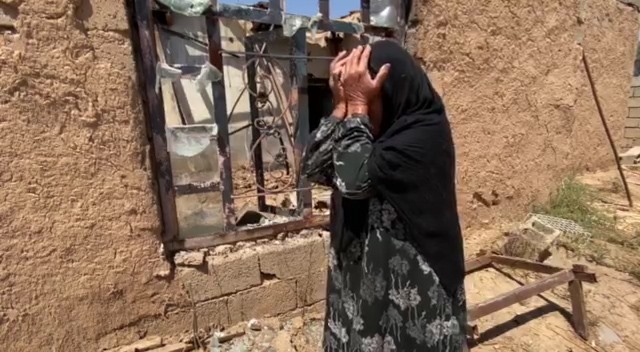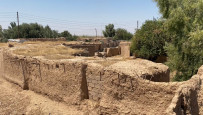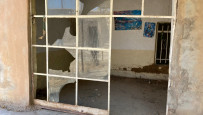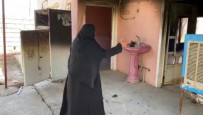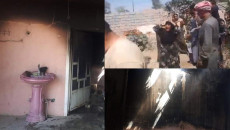Sobbing and lammenting, Azeema arrives at her burned down huse, and sees her furniture and other possessions destroyd, some turned into charcoal. In a whimpering and melancholic voice, she starts praying and cursing those who burned down her house and consequently forced her out of her ancestral village.
Every now then, she wipes her tears with her scarf and continues lamenting over her burned down house.
“I went to the market for an hour to buy some things. Some nefarious people set the house on fire while I was gone. And by the time I was back, my home was engulfed in flames. I felt like my own body was burning, all I could do was scream,” the 74-year-old Azeema Azeema Kaka’i told KirkukNow.
The incident took place on 23 August at the village of Arab Koyie in Daquq District, 44 km south of Kirkuk.
Azeema has been living on her own for the last three years. Her two sons left for Erbil after the events of 16 October 2017, when the Federal Forces forced Peshmerga forces out of the region after the KRG held an Independence Referendum.
But Azeema refused to leave with her sons and stayed behind, alone in her house.
Since the COVID-19 outbreak, she has been able to see her sons only on rare occasions due to the lockdowns and curfews.
I had many memories of my children in that house. They took that away from me too and broke my heart
“It was a miserable and lonely life, but I had many memories of my children in that house. They took that away from me too and broke my heart.”
By the time a fire engine reached the burning house, most of her furniture, along with her clothing, carpets and blankets were burnt, and two walls had collapsed.
The damage has been estimated to be worth thousands of dollars.
Azeema was forced to leave the village for Erbil to stay with her sons. The assault by ISIS, and years of armed and political conflict hadn’t made her leave, but now that her house was burned down, she was finally forced to leave.
Beside being located within the disputed areas, her village, like other Kaka’i villages in Daquq, have been an arena for armed conflicts. And in recent months, there has been an increase in violent attacks by unknown gunmen.
One of the windows at the backside of the house was broken and someone broke in from there and set the house on fire
Kawa Raf’at, one of Azeema’s sons who has been living in Erbil for three years, told KirkukNow: “One of the windows at the backside of the house was broken and someone broke in from there and set the house on fire.”
Security forces have opened an investigation after Azeema filed a complaint, but no suspect has been found so far.
A source within the security forces told KirkukNow that they don’t have any lead so far.
The population of Azeema’s village, Arab Koiye, consists of Arabs and Kaka’i Kurds. Before the events of 16 October 2017, there were 75 Kaka’i families living there, but currently only four remain.
“The burning down of my home ruined my life and forced me into displacement. I was never going to leave the house, but fate had other plans in store for me,” Azeema said.
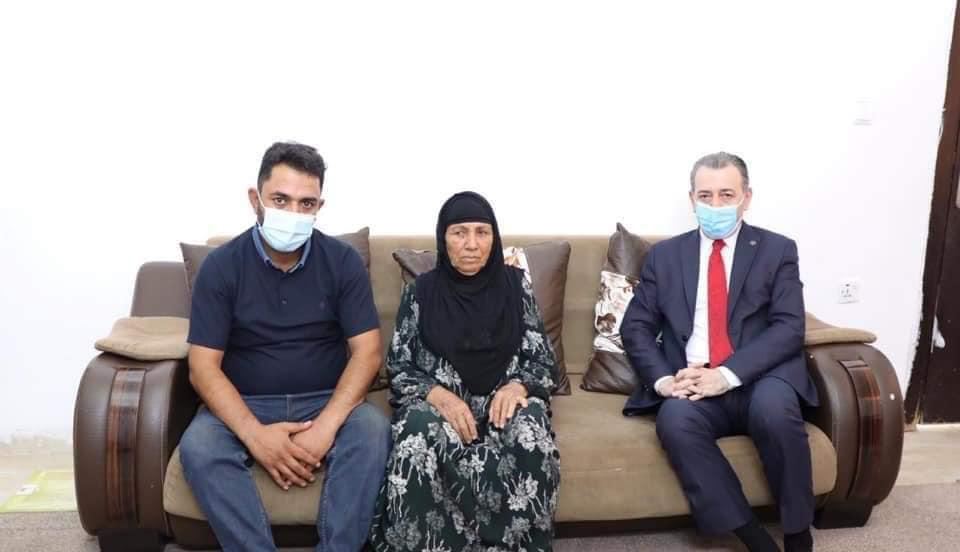
After the incident, the Kurdistan Regional Government Minister for Minority Affairs Aydin Maarouf, visited Azeema in Erbil, so that he could write a report on her case and send it to the Federal Government.
“My mother stays with me now, she is very depressed and cries all the time,” said Kawa.
Azeema suspects that the burning down of her house is related to the years-long conflict about farmland ownerships between different ethnicities.
Leaving her ancestral village, Azeema feels uprooted and depressed. The past three years, she has been hoping and waiting for her sons to go back to live with her in their home region.
Azeema’s livestock and dogs were unharmed in the fire, but she was forced to leave them behind.

